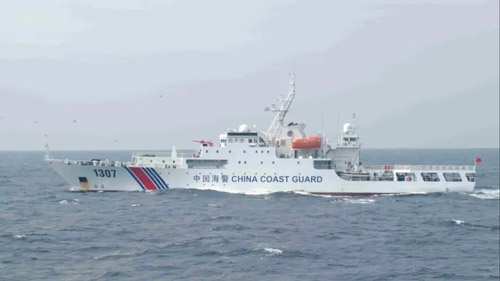by WorldTribune Staff, December 27, 2019
China’s practice of sending its vessels near the Japan-controlled Senkaku islands continued in the days prior to Japanese Prime Minister Shinzo Abe’s visit to China this week and could raise tensions ahead of Chinese supreme leader Xi Jinping’s state visit to Japan next year, analysts say.
Japan’s Coast Guard reported that Chinese government ships entered the waters immediately surrounding the islands in the East China Sea more than 1,000 times this year, a record. Of those, 114 encroached on Japan’s territorial waters.

Four more vessels traveled near the islands on Dec. 11 and 12, with all of them entering Japanese territory on Dec. 11, the Japan Coast Guard said. One was equipped with what appeared to be a cannon.
In his state visit to Japan scheduled for next year, Xi will meet with newly enthroned Emperor Naruhito and attend a reception at the Imperial Palace. Honor guard members from Japan’s Self-Defense Forces will salute the Chinese president.
A state visit is the most formal welcome given to a diplomatic guest of honor.
“But many in Japan see such red-carpet treatment as inappropriate in light of the national security issues,” Hiroyuki Akiyama noted in a report for Nikkei Asian Review.
Last month, a group of Japanese nationalist LDP lawmakers handed the prime minister’s office a written statement opposing state visit functions for Xi.
Beijing has been approaching Tokyo amid trade tensions with the U.S. When Japan hosts Xi, it will mark the first state visit by a Chinese president in 12 years.
“The explanation for why it should be a state visit, in which the emperor will appear before [Xi], is inadequate,” said Masahisa Sato, a former state minister for foreign affairs.
Since Japan nationalized the Senkakus in 2012, Chinese vessels have frequently encroached on the islands, which China claims and calls the Diaoyu. This year’s activity far exceeded the old record of 819 cases in 2013, Japan’s Coast Guard said.
“Such encroachments are counted when a ship travels into contiguous zones near a land mass, or within 24 nautical miles. Traveling within 12 nautical miles of the shore is considered entering territorial waters,” Akiyama’s report noted.
The China Coast Guard has oversight of state-operated ships. In 2018, it was placed under the administration of the paramilitary People’s Armed Police Force, which answers to the Central Military Commission. Under military control, Chinese border patrol vessels are increasingly armed.
China also continues to expand its presence in the South China Sea, which serves as a key Japanese sea lane. Large artificial islands have been built with runways and radar equipment.
Intelligence Brief __________ Replace The Media
